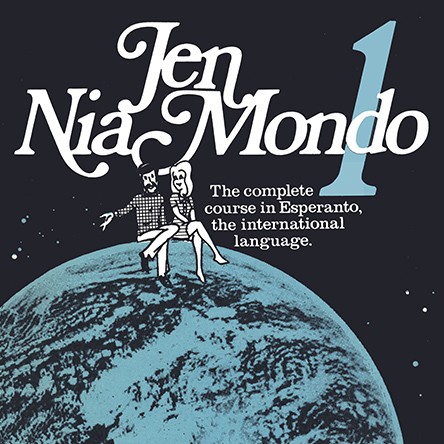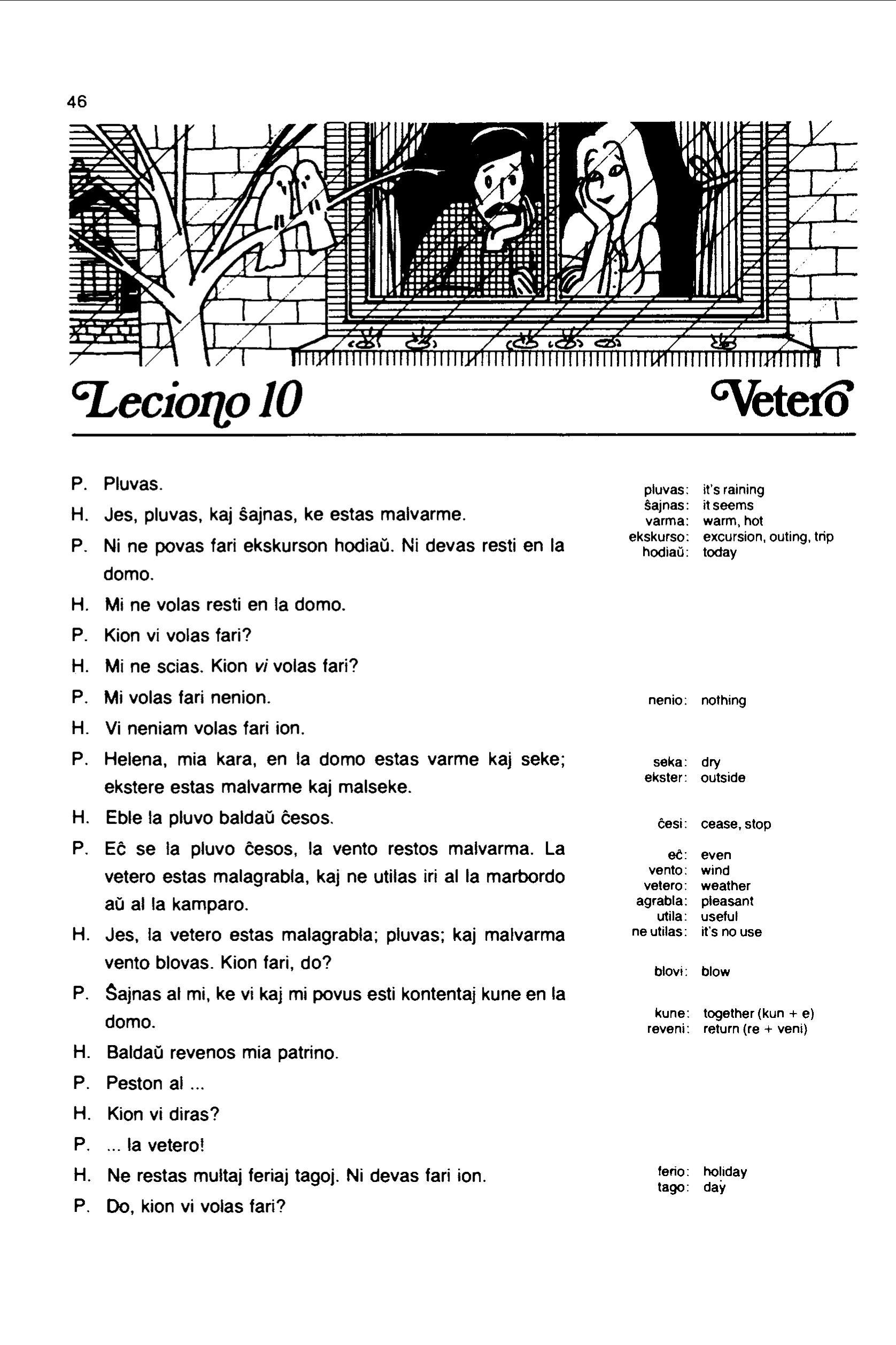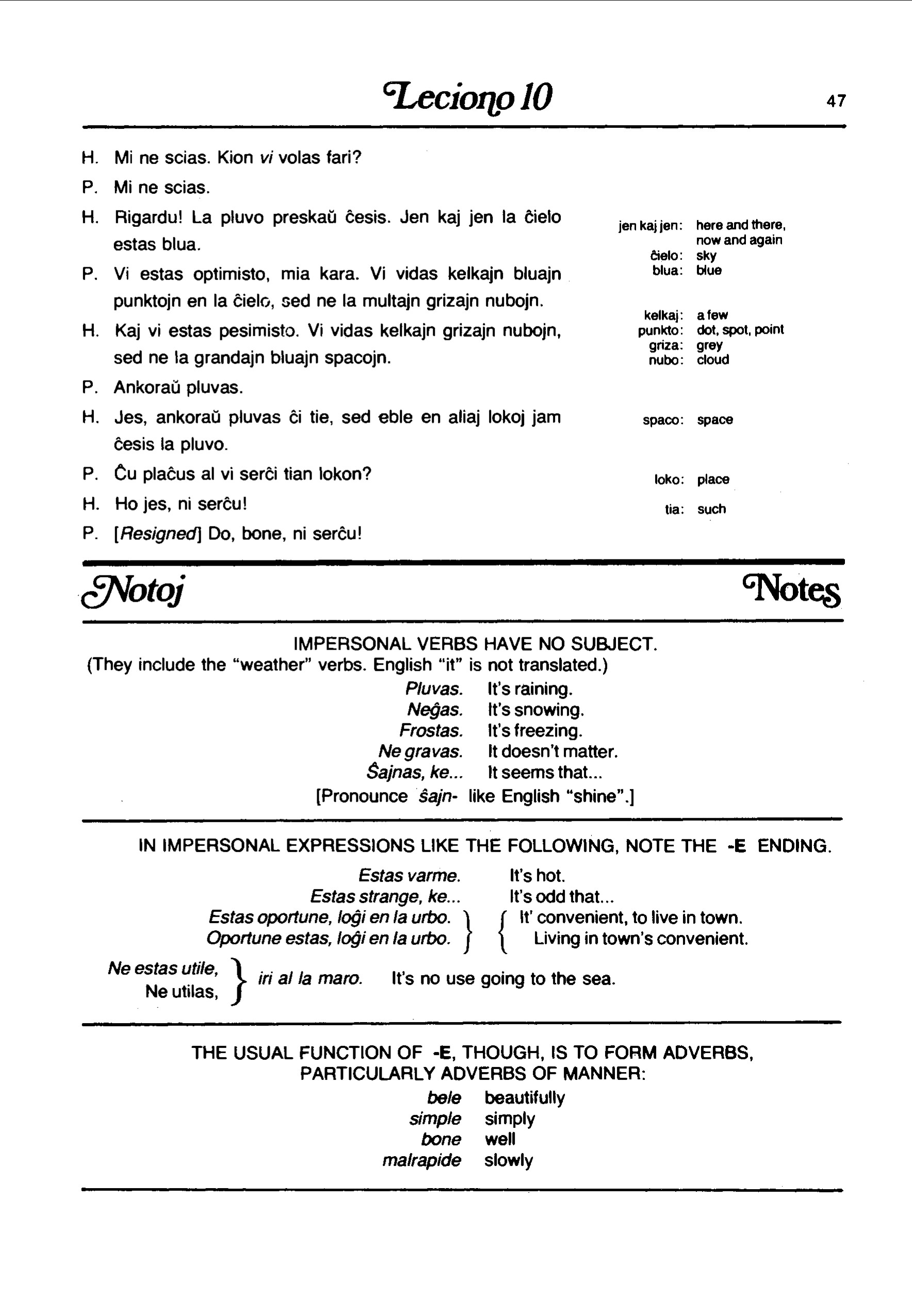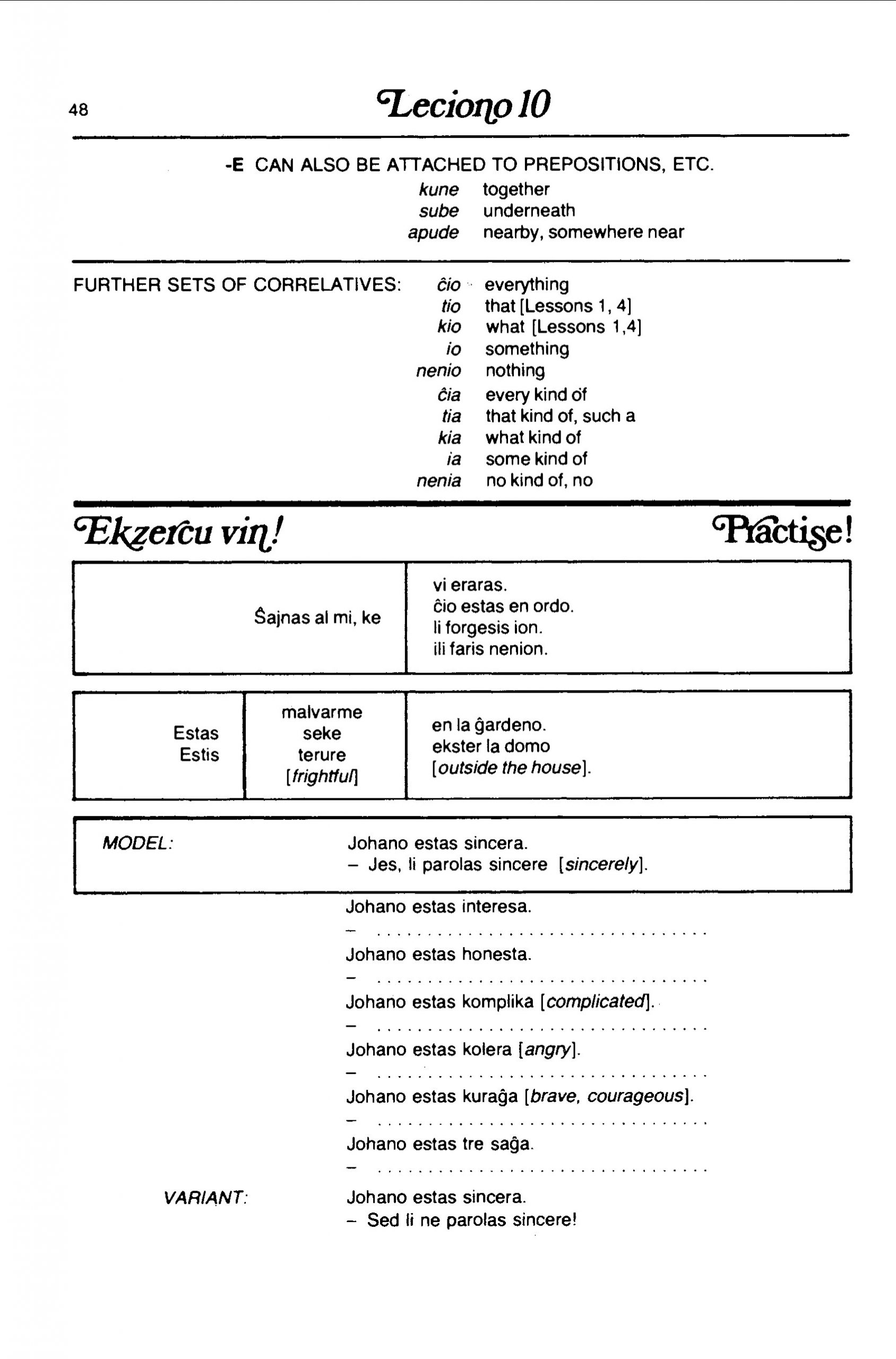





Sample answers are offered below
Did you find many points to make notes on? This lesson starts to explore in more detail how Esperanto works. This is its genius. It has ‘roots’ i.e. basic ideas which may in essence be names of things. For example the root ‘feri‘ is a day off work, a holiday (originally a holy day!) The root ‘feri‘ takes an ‘O’ ending to emphasise this. Traditionally we would call it a noun. John Wells’ dictionary lists it as ‘feri/o’ to show its root meaning. But the ‘root meaning’ may in essence describe things or situations. For example the root ‘laŭt‘ means ‘loud’ and takes an ‘A’ ending to confirm this. Traditionally we would call it an adjective. A third group of ‘roots’ points to actions. For example ‘ven’, listed ‘ven/i’ in dictionaries. Traditionally we would call it a verb.
Only rarely do these kind of roots appear without their confirmatory ‘ending’ or ‘category’. This is explained later in the course. Do all ideas or ‘roots’ in Esperanto need to take a confirmatory ending like this? If you have been studying the vocabulary following Lesson 12, you will know the answer is no. Indeed you have already met some – al, ankaŭ, ankoraŭ, antaŭ etc. Sometimes called ‘wordlets’ for fun this mystery also will be explored later.
Please attempt the exercises before consulting the material below
Lesson 10 Answers
Page 48
Ekzercu vin! – Exercise yourself!
Ŝajnas al mi, ke vi eraras – It seems to be you are wrong
Ŝajnas al mi, ke ĉio estas en ordo – (It) seems to me everything is OK
Ŝajnas al mi, ke li forgesis ion – It looks to me that he’s forgotten something
Ŝajnas al mi, ke ili faris nenion – Methinks they have done nothing.
Estas malvarme en la ĝardeno – It is cold / chilly in the garden
Estas seke ekster [outside] la domo – It’s dry outside (the house)
Estis terure ekster la domo – It’s terrible / awful outside
Johano estas interesa – Jes li parolas interese : John is interesting – Yes, John talks interestingly
Johano estas honesta – Jes, Johano parolas honeste : John’s honest. Yes, he talks honestly.
Johano estas k0mplika [complicated] – Jes, li parolas komplike : John is complicated. Yes, ke talks complicatedly
Johano estas kolera [angry] – Jes, li parolas kolere : John is angry – Yes, he talks angrily
Johano estas kuraĝa [courageous] – Jes, li parolas kuraĝe : John is brave – Yes, he talks bravely
Johano estas tre saĝa – Jes, li parolas tre saĝe : John is very wise – Yes, he talks very wisely
Johano estas sincera – sed li ne parolas sincere : John is sincere – But he does not talk sincerely
Page 49
dolĉa [sweet]: dolĉe – sweetly Li kantas al ŝi tre dolĉe – He sang very sweetly to her
klara [clear] : klare – clearly Li parolis tre klare kaj elegante – He spoke very clearly and with elegance
laŭta [loud] : laŭte – loudly Li kriis [shouted] laŭte – He shouted loudly
rapida – quick : rapide – quickly, fast Ŝi rapide komprenis la situacion [situation] – She quickly read (understood) the situation
subita [sudden] : subite – suddenly Ili subite kuris for – They ran away suddenly
absoluta – absolute : absolute – absolutely Oni devas esti absolute silenta – One / People must be absolutely silent
serioza – serious : serioze – seriously La fortega vento estas nun serioze danĝera [dangerous]. The super-strong wind is now seriously dangerous.
Li ofte respondas rapide – He often replies quickly
Li ĉiam parolas sincere – He always speaks sincerely
Ŝi neniam skribas klare – She never writes clearly i.e. the look of the text
Ŝi neniam verkas klare – She never writes clearly i.e. the expressions she uses
Note: Using the terms skribi for the act of forming the letters and verki for creating the content Esperanto can make the meaning clearer
Ŝi malofte respondas rapide – She rarely replies quickly
Li ofte parolas komplike – He often talks complicatedly.
Ŝi ĉiam respondas tuj. -, She always replies straightaway.
Skribaj Ekzercoj
bele – beautifully terure – frightfully kontente – contentedly varme – hotly strange – oddly plene – fully romantike – romantically saĝe – wisely libere – freely kuraĝe – bravely evidente – obviously fiere – proudly ĝentile – politely honteste – honestly firme – firmly utile – usefully forte – strongly importante – importantly hejme – at home rare – rarely
Note : Without a context the meaning of some English words may be ambiguous. For these exercises the context of the lesson itself should be assumed. As elsewhere bold letters are a reminder of where the stress falls.
1. Estas interese, ke Johano estas hejme. – It is interesting John is at home.
2. Strange estas, ke ŝi neniam parolis – It is strange she never spoke.
3. Estas bele kuŝi apud la maro – It is beautiful to sit by the sea.
4. Ŝajnas al mi, ke vi respondis honeste. – It seems to me he ansered honestly.
5. Ne gravas, ke pluvas. Ni restu en la hotelo hodiaŭ. – It’s not important that it is raining. Let’s stay in the hotel today.
6. Utile estas naĝi bone. It is useful to swim well.
Traduku!
P. Mi estas kutime optimisto, sed mi opinias {3}, ke ne ĉesos pluvi hodiaŭ. La nuboj estas ankoraŭ malagrable grizaj, kaj la vento restas malvarma. Ne sstas utile fari ekskurson kune en tia vetero, ĉu estas?
H. Kial ne? Mi ne povas kredi, ke vi volas fari absolute nenion hodiaŭ, eĉ se pluvas forte. Ĉar la vetero estas malbona, estus oportune viziti vian patrinon. Ŝia domo estas varma kaj seka, eĉ kiam estas malseke ekstere.
P. Vi estas tre saĝa, Helena. Ni certe vizitos mian patrinon hodiaŭ.
Lesson 10 New words to add to your word stock
Absolut/a
Agrabl/a
Blov/i
Ĉes/i
Ĉia
Ĉiel/o
Eĉ
Ekskurs/o
Ekster/e
Feri/o
Frost/i
Honest/a
Ia
Interes/a
Kelk/aj
Klar/a
Koler/i
Komplik/a
Absolute
Pleasant cf agreeable
Blow
Cease. Stop
Every kind of
sky
Even
Excursion
Outside
Holiday
Freeze
Honest
Some kind of
Interesting
A few
Clear
Be angry
Complicated
Kun/e
Kuraĝ/a
Laŭt/a
Neĝ/o
Nenia
Nub/o
Opportun/a
Punkt/o
Rapid/a
Re/ven/i
Sek/a
Spac/o
Strang/a
Ŝajn/i
Terur/o
Tia
Util/a
Veter/o
Together (with-ly)
Brave cf courageous
Loud
Snow
No kind of
Cloud
Convenient
Point
Quick cf rapid
Return
Dry
Space
Odd, strange
Seem
Terror
Such
Useful
Weather